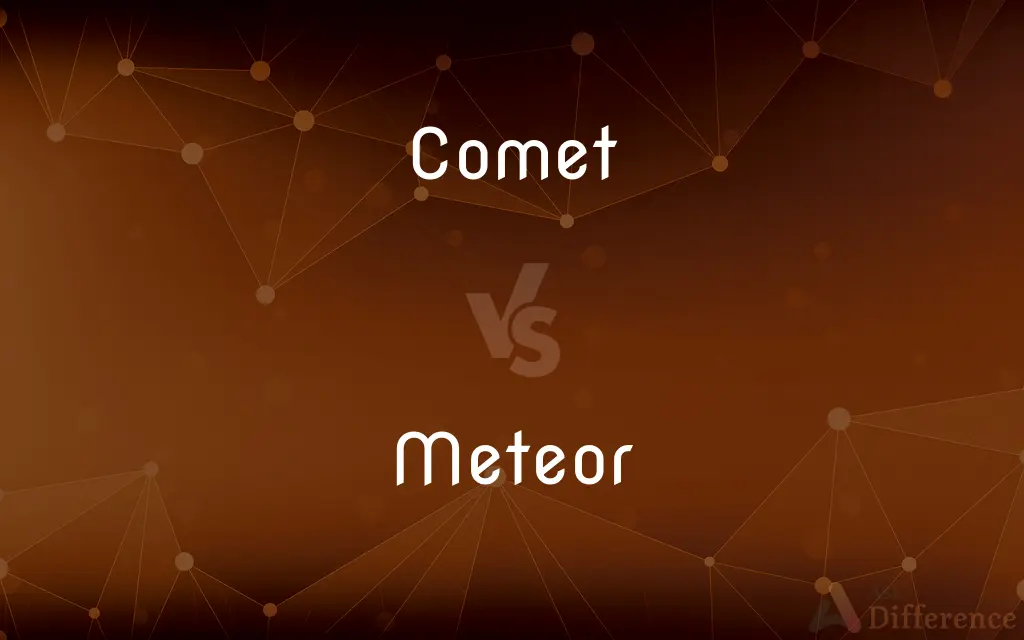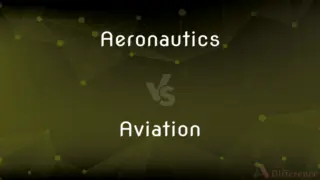Comet vs. Meteor — What's the Difference?

Difference Between Comet and Meteor
ADVERTISEMENT
Compare with Definitions
Comet
A comet is an icy, small Solar System body that, when passing close to the Sun, warms and begins to release gases, a process that is called outgassing. This produces a visible atmosphere or coma, and sometimes also a tail.
Meteor
A bright streak of light that appears in the sky when a meteoroid is heated to incandescence by friction with the earth's atmosphere. Also called falling star, meteor burst, shooting star.
Comet
A celestial body, observed only in that part of its orbit that is relatively close to the sun, having a head consisting of a solid nucleus surrounded by a nebulous coma up to 2.4 million kilometers (1.5 million miles) in diameter and an elongated curved vapor tail arising from the coma when sufficiently close to the sun. Comets are thought to consist chiefly of ammonia, methane, carbon dioxide, and water.
Meteor
A meteoroid or meteorite.
Comet
(astronomy) A small Solar System body consisting mainly of volatile ice, dust and particles of rock whose very eccentric solar orbit periodically brings it close enough to the Sun that the ice vaporises to form an atmosphere, or coma, which may be blown by the solar wind to produce a visible tail.
ADVERTISEMENT
Meteor
(Archaic) Any atmospheric phenomenon, such as a rainbow, lightning, or snow.
Comet
A celestial phenomenon with the appearance of such a body.
Meteor
An atmospheric or meteorological phenomenon. These were sometimes classified as aerial or airy meteors (winds), aqueous or watery meteors (hydrometeors: clouds, rain, snow, hail, dew, frost), luminous meteors (rainbows and aurora), and igneous or fiery meteors (lightning and shooting stars).
Comet
Any of several species of hummingbird found in the Andes.
Meteor
A fast-moving streak of light in the night sky caused by the entry of extraterrestrial matter into the earth's atmosphere; a shooting star or falling star.
Comet
A member of the solar system which usually moves in an elongated orbit, approaching very near to the sun in its perihelion, and receding to a very great distance from it at its aphelion. A comet commonly consists of three parts: the nucleus, the envelope, or coma, and the tail; but one or more of these parts is frequently wanting. See Illustration in Appendix.
Meteor
(juggling) A prop similar to poi balls, in that it is twirled at the end of a cord or cable.
Comet
(astronomy) a relatively small extraterrestrial body consisting of a frozen mass that travels around the sun in a highly elliptical orbit
Meteor
(martial arts) A striking weapon resembling a track and field hammer consisting of a weight swung at the end of a cable or chain.
Meteor
(figurative) Any short-lived source of wonderment.
Meteor
(intransitive) To move at great speed.
Meteor
Any phenomenon or appearance in the atmosphere, as clouds, rain, hail, snow, etc.
Hail, an ordinary meteor.
Meteor
Specif.: A transient luminous body or appearance seen in the atmosphere, or in a more elevated region.
The vaulty top of heavenFigured quite o'er with burning meteors.
Meteor
A mass of stone or other substance which sometimes falls to the earth from space beyond the moon, burning up from atomospheric friction and creating a brilliant but usually very brief trail of light in the atmosphere; also called a shooting star.
Meteor
A streak of light in the sky at night that results when a meteoroid hits the earth's atmosphere and air friction causes the meteoroid to melt or vaporize or explode
Meteor
(astronomy) any of the small solid extraterrestrial bodies that hits the earth's atmosphere
Share Your Discovery

Previous Comparison
Aeronautics vs. Aviation
Next Comparison
Deputy vs. Vice














































